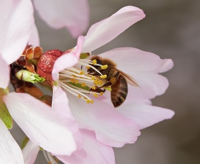Αμύγδαλα και μέλισσες
The almond industry is heavily dependent on bee health and effective pollination, making the symbiotic relationship between almonds and bees crucial for agricultural productivity. Almonds are one of the first crops to bloom in spring, requiring a significant influx of bee colonies to ensure pollination. However, this dependency presents challenges such as pesticide exposure, habitat loss, and diseases like the varroa mite, which threaten bee populations.

Recent research and initiatives have focused on mitigating these challenges to promote sustainable almond farming. Strategies include planting bee-friendly cover crops, which provide bees with nutrition before and after the almond bloom, and developing indoor storage facilities to protect bees from adverse weather and pests during the off-season. Additionally, the Almond Board of California has promoted best management practices to minimize pesticide exposure during critical pollination periods.
Bee rustling, the theft of bee hives, has emerged as a significant issue, driven by the high demand for bees during the almond bloom. This illegal activity exacerbates the challenges faced by beekeepers and underscores the need for improved security measures and cooperation between farmers and beekeepers.
Overall, enhancing bee health through innovative practices and collaborative efforts is essential for the sustainability and economic viability of the almond industry. These measures not only support pollinator health but also contribute to the resilience and productivity of almond orchards.



